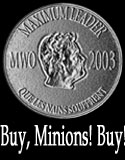Greetings, loyal minions. Your Maximum Leader, at long last for those of you out there who love ham, has finally loaded in the photos to complete the story of his Easter ham.
For those of you who missed it, you can click here to read about the quest for the ham.
So… When last we left the story your Maximum Leader had a ham that was being stored at the Villainschloss for Easter dinner. Now you may be asking yourself, “Self, this glorious ham that my Maximum Leader quested for, what could it look like?” Good question there. If you have never seen a Smithfield ham (or a Country ham - since the only difference betwix the two is where the curing was done) straight from the smokehouse you can now feast your eyes on this… (NB: For the sake of space on this page your Maximum Leader has opted to use thumbnails. If you so desire you may clicky the smallish pic to embiggen it.)

This photo is of the skin side of the ham. This is the “top” of the ham. As you can tell from the photo this was a right side ham. Some people believe that there is a difference in the quality of the meat between the left and right side hams. Your Maximum Leader has never been able to tell a difference from one side to the other on the same pig. Although he has tasted differences from pig to pig…

This photo is the bone side of the ham. You may notice the discoloration near the bone. That grey-brown splotch is a harmless mold that grows (frequently) on salt-cured hams. It is superficial and can be wiped off with a sponge (or even a dry paper towel) before you soak the ham.
So… There you have the ham. It’s a beauty n’est-ce pas? Oh yes. A beauty.
So… Easter is a Sunday. (Duh.) Your Maximum Leader started to prepare his ham on Palm Sunday. He took a paper towel to the ham and wiped off some (but not all - he got lazy) of the pepper that coated the ham after salting and through smoking. Normally your Maximum Leader is pretty diligent about this step of “cleaning the ham.” But he was sort of busy that day and did a half-arsed job. Lucky for him, since he was soaking the ham for so long there was little chance that the pepper and any surface detrious would remain.

Here you have a photo (courtesy of Villainette #2) of your Maximum Leader hosing down the ham in a cooler. Well… It wasn’t really hosing down the ham. It was more like putting the ham in a cooler and using the hose to fill the cooler with water so that the ham was completely immersed in the water to a depth of a few inches.
This is the critical part of preparing the ham. Once a Smithfield ham is cured, it is inedible. This is how the meat is preserved. If you can’t eat it, it is unlikely that various critters can eat it. (Hence this is how hams were cured for millenia before refigeration.) Your Maximum Leader put the ham in the water Sunday night. He drained the cooler the next morning and filled it again immediately. Thereafter he “changed the water” at least daily (he might have missed a change - but he sometimes did it twice a day) until Friday night. On Good Friday your Maximum Leader packed up the family in Ye Olde Suburban (Mrs Villain’s primary vehicle) and alighted to his sainted in-law’s home.
So, Saturday morning your Maximum Leader drained the ham for the final time and gave it a quick wash. Since this was sort of early in the morning he forgot to take a picture. Why was it early in the morning you ask? Well… Your Maximum Leader’s ham was 15.5 pounds cured. He estimated it had picked up about 5 pounds of water weight. So it now weighed about 20 pounds. In case you forgot… That ham was cured - not cooked. So that cured meat is still uncooked pork. Not good for eatin’. How does one cook a country ham. Well… You can’t just put it in the oven and let it go. The salt in the meat (and even after 6 days of osmosis there is a lot of salt in the meat) would cause the ham to dry up and be inedible through cooking in an oven. So the next step is to boil your ham.
Now your Maximum Leader should have taken a tape measure out and given you a measurement on how long the ham was. You can judge from its position in the cooler about how big it is. As you can imagine you need a hell of a pot in which to boil that sucker. Lucky for you all your Maximum Leader has a hell of a big pot. His pot is good for boiling hams - or steaming a half bushel of crabs - or about a dozen lobsters.

This phot shows the ham in the pot. Now you are probably noticing something here… The ham has been dismembered. Yes, loyal minions… It has. You see your Maximum Leader’s pot is very big… But not so big that he could immerse the whole ham in it. Since he didn’t want any part of the ham to go unboiled, he and his father-in-law performed a surgery of which a Civil War era “sawbones” would be proud. The hock of the ham was boiled in the same pot.

In case any of you were wondering what type of rig your Maximum Leader used to get the pot boiling… Let this photo show you. This rig is also used in the aforementioned steaming of crabs and lobsters… We had one propane tank standing by in case the one shown ran out of gas (literally). But, we didn’t have to go to the auxillary tank.

Here we are about an hour into the boil. As you can see the pot is boiling well. You can also see the froth and some rendered fat on top of the water. It is important to keep an eye on the boiling pot because if some of the liquid sloshes over the side (which it will) you have the potential for the dual niceties of the fat igniting on the side of your pot (or on the ground) and your flame going out. So keep an eye on your boiling ham.

Here you have your Maximum Leader checking the ham - as he did ever 15 minutes for the nearly 6 hours he boiled the ham. The rule your Maximum Leader uses is about 20 minutes boiling for every pound of weight. (20 pound ham = 6.6 hrs of boiling.) Your Maximum Leader says nearly six hours. It was more like 5 and a quarter. You see… Cutting off the hock reduced the cook time by reducing the weight of the ham - and creating another fleshy side (not covered in fat) for the boiling water to seep into the ham. In case you are wondering what exactly your Maximum Leader is doing here… He is moving the ham in the pot. This doesn’t aid in cooking, but does prevent the ham from cooking to the side of the pot and burning in a spot. (Your Maximum Leader learned this important titbit in 1992 when he had to spend hours scraping incinerated pig fat off the side of his cook pot.)

Five hours and fifteen minutes after going into the water… This is what you get. One fully cooked Smithfield ham. This photo shows the ham only about 4 minutes out of the pot. Your Maximum Leader got the ham out of the pot, turned off the gas, then ran to the kitchen to start removing the fat. This is best done, in your Maximum Leader’s opinion, when the ham is hot. Sure the fat is slippery and sort of slimy. Sure it burns when it touches you… But it is most easily separated from the good stuff when it is hot. This photo was taken by Villainette #1 after your Maximum Leader had taken one swipe at the fat with is knife.

Here is the glorious finished product. One cooked and cleaned Smithfield ham.
At this point the ham is ready for eating. And, truth be told, a small bit was carved off the end of the ham and sliced thinly and the whole family partook of the ham as it was.
The ham was just as good as it was in Dee Dee and Tommy Darden’s store. Just like in that first sample Dee Dee had offered, you could taste the salt, the smoke, and the nutty finish. It was a good a ham as your Maximum Leader has ever had in his life.
So… Saturday night the ham was wrapped in foil and refigerated. On Easter, your Maximum Leader took out the ham and put a light glaze on it and reheated it. For those of you interested in the details… The glaze was a thin mixture of mustard, honey and brown sugar. He reheated it in the oven at 350 for about 35-40 minutes. Really it was in the oven just long enough for the glaze to set and brown. Your Maximum Leader runs hot and cold on the glazing of country hams in general. Sometimes the very faint trace of the sweet and spice is a help to offset the salt of the meat. Sometimes it is a distraction. In this case the glaze was nice since the ham was served warm with scalloped potatoes, grilled asparagus, green salad and a few fried oysters. (Dessert was the best damned Key Lime pie on the face of the planet - courtesy of your Maximum Leader’s good friend Joe - the founder of the Key West Key Lime Pie Company.)
Your Maximum Leader and his family consumed lots of ham… But we still had lots of leftovers. Your Maximum Leader cut off quite a bit of meat in large-ish chunks. He left a considerable amount of meat on the bones with the understanding that his beloved mother-in-law would use the bones (and the meat attached thereto) and make a good bean soup for the big oyster roast she’ll be having at the end of April (and the end of Oyster season). Another chunk went to some other friends down in the Northern Neck. Your Maximum Leader put another chunk in his freezer for later. Then he gave away the rest to various friends around Fredericksburg. In case you were wondering… It is the unanimous opinion of everyone who has tasted the ham that it is one of the best they’ve ever had - if not the best outright.
So once again… If you don’t want to make the trek yourself you can get a ham from Tommy & Dee Dee Darden at the following address:
Darden’s Country Store
16249 Bowling Green Rd
Smithfield VA 23430
757-357-6791
deedeedarden - at - aol - dot - com
Your Maximum Leader is already planning a second trip to the Darden’s later this year to get another ham… Possibly one for Christmas or New Years…
Carry on.













